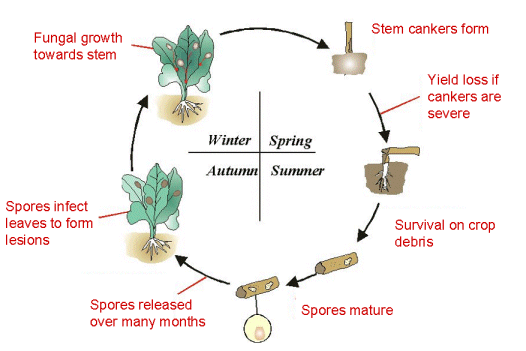Phoma stem canker - Epidemiology
Biology
Phoma stem canker (blackleg), caused by Leptosphaeria maculans, is an important disease on oilseed rape (canola, rapeseed,Brassica napus, Brassica juncea, Brassica rapa) causing seedling death, lodging or early senescence in Australia, Canada and Europe.
Severity of phoma stem canker epidemics is affected by the pathogen population structure, oilseed rape species and cultivar resistance, climate and agricultural practices.

Infections are initiated by airborne ascospores, which are released from fruiting structures (pseudothecia) on crop debris after a period of maturation. Ascospores require high humidity or surface wetness on leaves or cotyledons for infection to occur. In susceptible plants, leaf infections appear as pale leaf spots (phoma leaf spots) from which the fungus spreads via the petiole to reach the stem. Leaf spots also produce asexual fruiting structures (pycnidia) which release spores (conidia), which can cause secondary infections in some situations.
Stem infections incubate (over winter in English conditions), eventually appearing as stem cankers at the stem base (crown) and as upper stem lesions. Infections on cotyledons and leaves early in the season produce the most damaging stem cankers at the stem base. Development of both crown cankers and phoma stem lesions higher up stems is most rapid in regions with high temperatures from flowering to harvest, such as Australia and Canada. Breeding for resistance (genetic, disease escape or tolerance), stubble management, crop rotation and fungicide seed treatments are important strategies for control of phoma stem canker in all areas. Fungicide spray treatments are justified only in regions such as western Europe where high yields are obtained, and accurate forecasts of epidemic severity are needed to optimise their use. Infection of pods can lead to seed-borne disease, which may spread the disease to completely new parts of the world.
A closely related species, Leptosphaeria biglobosa (formerly known as the B-group or Tox0 form of Leptosphaeria maculans) is similar to L. maculans (senso stricto), which was formerly called the A-group of Tox+. L. biglobosa is also a pathogen of oilseed rape although symptoms in England are normally not damaging to yield.
